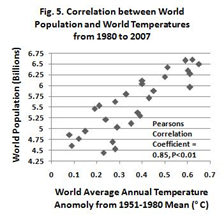

Doogles31731
Senior Members-
Posts
82 -
Joined
-
Last visited
Content Type
Profiles
Forums
Events
Everything posted by Doogles31731
-

Climate change (split from Climate Change Tipping Points)
Doogles31731 replied to Doogles31731's topic in Climate Science
I respect TheVat from my association with him in another forum and will take his advice to narrow my discussion, for now, down to the matter of controlling population growth in order to help control a problem regarded as anthropogenic. I notice that the OP of the ‘Tipping Point’ thread said that thousands of scientists had formed a group and produced recommendations for consideration. I notice that one of the world problems they think should be addressed is world population growth. I endorse that wholeheartedly. But when I read the recent 2021 IPCC Summary of recommendations, I performed a 'search and find' for the word ‘population’ with a negative outcome. It’s hard to believe that any objectively-thinking world body could make claims that a situation is anthropogenic, without making any positive recommendations for slowing down the cause. I searched Google for a graph correlating increasing temperature anomalies with population without success, but just to confirm that population MAY have a role in some of the temperature increase, I produced a graph myself some years ago. I fully realise the difficulty of the task and that it has to involve religious and political hurdles. I also know that TheVat had some ideas in the past about why it is not being addressed by any world body, but I’d also be interested in the thoughts of others. 1220875285_CLIMATECHANGEwebsiteinspcf.docx -
I’m having trouble deciding where to start in this Climate Change thread. I’m not a climate scientist, so I can only make comments to some extent on the broad picture. I’m not a member of any group, and any thoughts I present are the results of my own research on aspects of the claims. As distinct from the general thrusts of arguments to date, I’m pleased to say that the IPCC appears to be becoming more conservative about the average global near surface temperatures. It’s a huge change from the ‘Mann hocker stick” and ‘Al Gore’ alarmist days. The 2021 Report Summary relating to temperatures is contained in Section A.1.1, which says, in part, -- “Each of the last four decades has been successively warmer than any decade that preceded it since 1850. Global surface temperature in the first two decades of the 21st century (2001-2020) was 0.99 [0.84- 1.10] °C higher than 1850-1900 . Global surface temperature was 1.09 [0.95 to 1.20] °C higher in 2011– 2020 than 1850–1900, with larger increases over land (1.59 [1.34 to 1.83] °C) than over the ocean (0.88 [0.68 to 1.01] °C). The estimated increase in global surface temperature since AR5 is principally due to further warming since 2003–2012 (+0.19 [0.16 to 0.22] °C).” Has anyone asked the question as to whether we would be better off globally if our temperature was a couple of degrees warmer? Apparently somebody has, because a paper published in Lancet this year -- Zao et al (2021; https://www.thelancet.com/journals/lanplh/article/PIIS2542-5196(21)00081-4/fulltext) -- came up with this conclusion -- “Globally, 5 083 173 deaths (95% empirical CI [eCI] 4 087 967–5 965 520) were associated with non-optimal temperatures per year, accounting for 9·43% (95% eCI 7·58–11·07) of all deaths (8·52% [6·19–10·47] were cold-related and 0·91% [0·56–1·36] were heat-related). “ This means of course that we have 9 times less deaths related to hot weather than we do from cold weather. Such a positive outcome has to be balanced of course with the claimed disadvantages of the overall small average increase in global near surface temperatures. The proponents of climate catastrophe claim that the adverse effects of warming are obvious -- rising sea levels, loss of glaciers and sea ice around the poles, polar bears dying off, coral reefs dying, more severe cyclones, wildfires etc. I’ve had a look at some of these claims, and I find them questionable. For example, forest fires don’t appear to have been too unusual in Russia during the last 750 years -- https://www.sciencedirect.com/science/article/abs/pii/S0277379111000655 and polar bears are increasing in numbers -- https://fee.org/articles/the-myth-that-the-polar-bear-population-is-declining/. Severe cyclones are NOT more frequent in Australia -- https://en.wikipedia.org/wiki/Australian_region_tropical_cyclone -- Severe Tropical Cyclones frequencies recorded were -- 76, 67, 65, 41, 38 in the 1970s, 1980s, 1990s, 2000s, and 2010s respectively. The figures for Hurricanes in the USA do not show any significant difference statistically on a decadal basis -- see https://en.wikipedia.org/wiki/List_of_United_States_hurricanes. Would less ice in the Arctic facilitate shipping and trade from a 'North West' passage? Does anyone else check these claims? I’ll leave it there for now, rather than make the post too long.
-

Do people with high conscientousness like to work?
Doogles31731 replied to Hans de Vries's topic in Psychiatry and Psychology
As you can tell from my nom-de-plume numerals, I've just turned 90, but I'm happiest when I have productive physical work to do. In my case, conscientiousness may be irrelevant to liking to work. I was lucky 10 years ago when a local resident was unlucky enough to have his house, and property-based business submersed in the 2011 floods. It was obvious that he needed help to hose off all the mud from everything. Not only that, but he discovered that his 'storm and tempest' insurance did not cover 'flood' damage, so he had to totally renovate his own house, as well as keep his business afloat. I stayed on to help with his business. I've been helping out voluntarily for 6 hours a day some 2 or 3 days a week in doing preliminary repairs on box air conditioners and water coolers; I get a strange satisfaction out of diagnosing and fixing broken down machines. As distinct from my 40 years of working with animals as a veterinarian, I don't get bumped, kicked, scratched or bitten by these mechanical things. But most of my work is in scrapping old domestic and contractor-hut air conditioners and water coolers. It can be dirty and dusty work; decayed remains of mice, rats and geckos are par for the job, as well as accumulated filth and dust. It doesn't worry me. I separate the ferrous, bronze, copper and plastic components for dumping and scrap metal. My main task seems to be in crimping copper tubing with bolt cutters before breaking it manually into short lengths so that it can be transported in 20 litre buckets. I suppose the positive feedback is that it develops my pectoral muscles in particular. When I go to the gym once a week, I can do 20 reps at 100 kg on the pecs machine, if I part my arms the distance of bolt cutters -- about 40 cm (16 inches). With full arm extension, I can only press about 10 reps of 60 kg. Somehow I get some satisfaction out of keeping my body active, and I suppose I feel I am doing something useful as well. Maybe I'm conscientious about keeping active, but I would be extremely disappointed if my friend sold the business and I was unable to do that work any more. Perhaps the OP should be discussed on the basis of what each of us is conscientious about. -

Gut microbiome change reverses atherosclerosis
Doogles31731 replied to Hans de Vries's topic in Medical Science
Thanks for adding to the discussion, Charony. That reference, supplied by Hans deVries, to work by Ghadiri et al, was remarkable in my opinion. Like you, my guess was also at the level of ‘gut feeling’, but it was based on two premises -- that much evidence (above) suggests that vitamin K2 improves arteriosclerosis, and that the main source of vitamin K2 in mammals at least is the gut microbiota. My hypothesis could be checked of course if Ghadiri et al were able to re-run their experiment and do blood assays for vitamin K2 or matrix-gla-protein. I notice that the mice treated with the cyclic peptide also had lower cholesterol concentrations. Back in 1997, Kawashima et al (1997; https://www.jstage.jst.go.jp/article/jphs1951/75/2/75_2_135/_article/-char/ja/) produced evidence that “ ... pharmacological dose of vitamin K2 prevents both the progression of atherosclerosis and the coagulative tendency by reducing the total-cholesterol, lipid peroxidation and factor X activity in plasma, and the ester-cholesterol deposition in the aorta in hypercholesterolemic rabbits." Although inflammatory products are found in atheromas, I haven’t come across any evidence, to date, that anti-inflammatory agents reduce atherosclerosis. I could have missed some literature on it. Can you supply any? There are statins of course, but the very best reduction in atheromas that they have shown to produce experimentally is of the order of one or two percent. This is why the 40% reduction in the OP reference is so remarkable. -

Gut microbiome change reverses atherosclerosis
Doogles31731 replied to Hans de Vries's topic in Medical Science
I can offer a possible guess as to why that might work. Vitamin K2 is mainly obtained from the gut microbiome in mammals. One would have to postulate that the peptides encourage the growth of micro-organisms that manufacture vitamin K2 or else provide a substrate for such micro-organisms to manufacture vitamin K2. There is evidence of a deficiency of vitamin K2-MK4 in particular in cases of atherosclerosis. Jie et al (1995; http://www.sciencedirect.com/science/article/pii/0021915095055377 Luo et al (1997; https://www.ncbi.nlm.nih.gov/pubmed/9052783 Schurgers et al (2001; https://link.springer.com/article/10.1007/s003920170043 Wallin et al (2008; https://www.thrombosisresearch.com/article/S0049-3848(07)00456-2/abstract Knapen et al (2015; https://www.thieme-connect.de/DOI/DOI?10.1160/TH14-08-0675 Vissers et al (2016; https://www.atherosclerosis-journal.com/article/S0021-9150(16)31216-3/abstract Lees et al (2018; https://heart.bmj.com/content/105/12/938.abstract Roumeliotis S et al (2020; https://www.ncbi.nlm.nih.gov/pmc/articles/PMC7193028/ The above references collectively suggest that Vitamin K2-MK4 has some therapeutic effect, but that Vitamin K1 (phylloquinone) deficiency is not involved in atherosclerosis. Just to keep a balance in this post, although the paper by Knapen et al (2015) above, suggests that vitamin K2-MK7 had some therapeutic effect, two more recent papers suggest that vitamin K2-MK7 had no therapeutic effect. Zwakenberg et al (2019; https://academic.oup.com/ajcn/article/110/4/883/5544545 De Vriese et al (2020; https://jasn.asnjournals.org/content/31/1/186.abstract The evidence suggests that vitamin K does not act directly, but by being a co-factor in the activation of raw proteins produced in turn by vitamin D. Unfortunately, extremely few researchers who have set out to assess the therapeutic value of vitamin Ks, have taken any steps to ensure that subjects in trials have had adequate vitamin D concentrations. This could explain the variable results.


